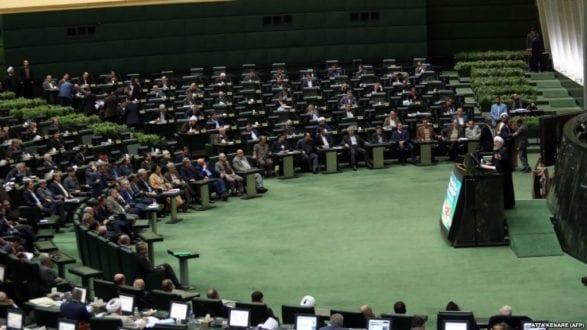iranintl – Less than two weeks after the lackluster elections in Iran, hardliners who have claimed victory find themselves embroiled in a contentious battle over the speakership of the parliament.
The struggle for this coveted position commenced months prior to the next parliament’s convening. Meanwhile, due to the remarkably low turnout in the capital, more than half of the lawmakers representing Tehran are yet to be determined in April, as many candidates failed to secure at least 20 percent of the total votes in the city.
Amidst this lull, several politicians are fiercely vying for the opportunity to occupy the prestigious Speaker’s green seat. Among the most ardent contenders is the incumbent Speaker, Mohammad Bagher Ghalibaf, who perceives his presence in the Majles (parliament) as inconsequential unless he assumes the role of Speaker.
Supreme Leader Ali Khamenei has at least twice warned the winners of the election to avoid controversies and attacks on each other. However, with his influence waning, the power struggle persists both within and outside the parliament. It appears that he has relinquished the idea of intervening in the matter, once being the ultimate authority on all issues. While he continues to express his viewpoints, there seems to be a lack of receptiveness from others to heed his counsel.
However, Some media outlets in Iran contend that a last-minute intervention, often referred to as “blessings in disguise,” by Khamenei could aid Ghalibaf in retaining his position. Despite experiencing a significant decline in popularity among voters, with his 2024 vote count dropping to around 400,000 compared to over 1.2 million in 2020, Ghalibaf may still benefit from Khamenei’s support. This perspective is underscored by his staunch political rival, the fundamentalist Hamid Rasaei.
Other contenders for the position include ultraconservative Mahmoud Nabavian, a member of the Paydari Party and a prominent anti-US figure, who garnered the highest number of votes. Additionally, there’s Morteza Agha-Tehrani, another influential member of Paydari. Former Foreign Minister Manouchehr Mottaki is also in the running, speculated by the press to capitalize on the rivalry among ultraconservatives.
Leading up to the election, Ghalibaf faced a significant smear campaign from his rivals, aided by conservative propagandist Ali-Akbar Raefipour, who reintroduced Rasaei to the political arena after four years of isolation. Meanwhile, Ghalibaf finds himself with minimal support in the new parliament, as all his aides must participate in the run-off election before they can exert any influence.
Ghalibaf is expected to vie for the Speaker position without relinquishing all other positions at the presidium of the parliament to Paydari, as he did in the previous Parliament. However, Paydari’s influence and astuteness have increased since 2020. Ghalibaf’s prospects for this position rely heavily on whether Khamenei, as both a relative and an old ally, is capable and willing to support him. In the meantime, while Rasaei spent Saturday lobbying at the parliament, some of the new members of the Majles appear to be adamant to reject his credentials when the new legislature convenes. In short, the hardline winners have never been as divided as they are now.
Conservative newspapers including Khorasan, Farhikhtegan and Kayhan, joined the IRGC-linked Javan daily to attack Rasaei, but he is still defiant and continues campaigning against Ghalibaf alongside his fundamentalist patrons.
The conflict, at the same time, reveals younger politicians’ competition with the old guard. Relatively younger MPs such as Rasaei wish to bring about a change in the government’s rigid structure and to open their way to financial resources and political power. That is unlikely to happen unless Khamenei chooses to allow them access to power.
Many in Iran await his traditional [Iranian] New Year address on March 20 to look for a change and a roadmap out of the current and other long-standing crises.
In a commentary in Etemad newspaper and his own Telegram channel, veteran reformist commentator Emadeddin Baghi pointed out that “the low turnout in the recent election had a clear message for Iranian officials [including Khamenei], which has not been taken seriously by them. Ignoring that message will have fateful and punishing repercussions.”
 Shabtabnews In this dark night, I have lost my way – Arise from a corner, oh you the star of guidance.
Shabtabnews In this dark night, I have lost my way – Arise from a corner, oh you the star of guidance.



